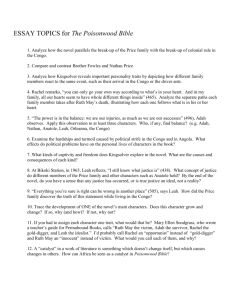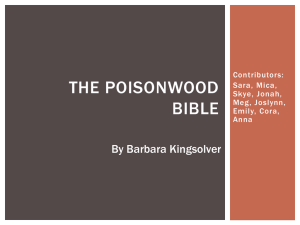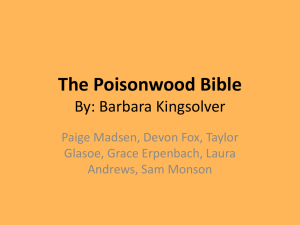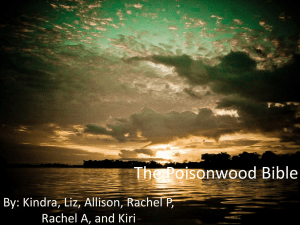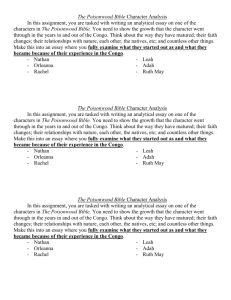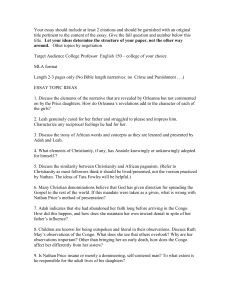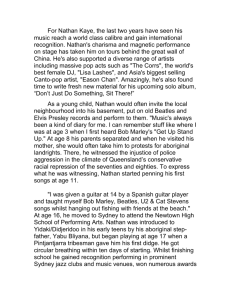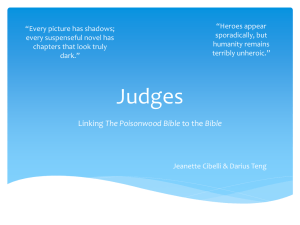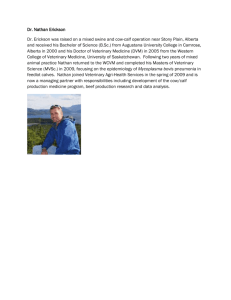A Study Guide for The Poisonwood Bible
advertisement
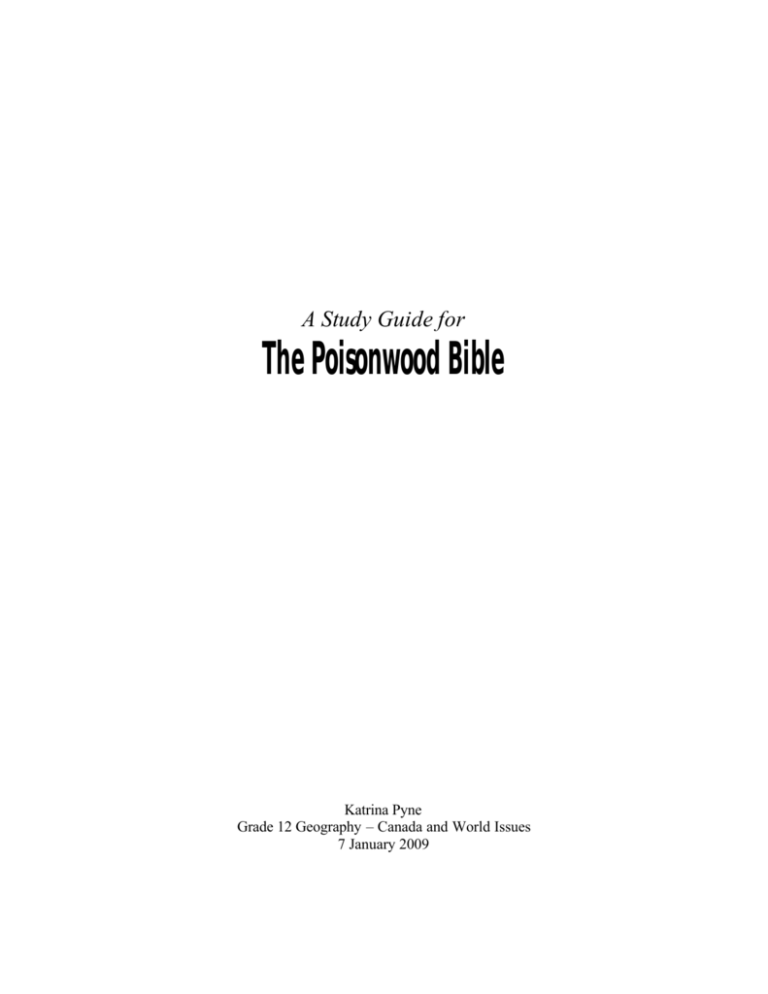
A Study Guide for The Poisonwood Bible Katrina Pyne Grade 12 Geography – Canada and World Issues 7 January 2009 Table of Contents Introduction______________________________________Page 1 Map____________________________________________Page 2 Glossary_________________________________________Page 3 Study Guide Questions for Book 1______________________________ Page 4 Questions for Book 2_______________________________Page 5 Questions for Book 3_______________________________Page 5 Questions for Book 4_______________________________Page 6 Questions for Book 5_______________________________Page 7 Questions for Book 6_______________________________Page 8 Questions for Book 7_______________________________Page 9 Introduction To The Poisonwood Bible Study Guide The Poisonwood Bible is a novel rich with the complex beauty that is the Congo. Reverend Nathan Price is a Baptist missionary determined to play out Gods vision by converting every last African in the Kilanga tribe; he embodies cultural imperialism. With him he drags his four daughters and wife Orleanna into the depths of the Congo’s most dense jungles. Through fire and brimstone, he strives to gain the forgiveness of God for his cowardice in years past. His daughters and wife narrate the story through a series of journal like entries. Each of them discovers the affects colonization had on the people, and each deals with the guilt that comes along with such a past, differently. From the emotional battles to the phys ical challenges the Congo makes everlasting impressions on each character in the fictional village of Kilanga. The Congo was colonized by the Belgians in 1908 when King Leopold relinquished his control after years of oppression. The Price family arrives on the brink of Congolese Independence. The map provided shows the regions of the Congo as seen today. The glossary will provide various terms in the Kikongo language that is used by the Congolese people frequently in the novel. Many of the terms have no direct English equivalent which make them all the more valuable to understand. Lastly the study guide will take an in depth look at the way the novel plays out by focusing on character analysis, themes, Congolese politics, and a general understanding of the text. GOOD LUCK! Glossary Kikongo Vocabulary 1. Okapi: An animal once thought to be merely legendary but is actually a horse like gazelle, relative of the giraffe. “Than in the 1920’s, when elsewhere in the world the menfolk took a break between wars to perfect the airplane and the automobile, a white man finally did set eyes on the Okapi. I can picture him spying on it with binoculars, rising up the cross-haired rifle sight, taking it for his own.” 2. Bangala: Can mean "dearly beloved" if spoken slowly, or else "Poisonwood Tree" if spoken quickly. “Tata Jesus is Bangala!” 3. Manioc: A native food staple to the Kilanga people that is bland in taste. “These women spent their days in the steady labors of planting, digging and pounding manioc, though the dreamy way they moved through that work made it seem entirely separate from any end product.” 4. Kakakaka: A fatal digestive bug causing the deaths of many children in Kilanga. “The rainy season had gotten heavier and the whole village was coming down with the kakakaka.” 5. Nganga: Witch doctor, a widely accepted part of culture in the Congo. “Nganga Kuvudundu could make live people dead, and dead people comeback alive.” 6. Nkisi: A small amulet that is worn and believed to hold ones spirit, keeping them safe from the pain of death. “He said now if anything happens to me, if I start fixing to die or something, hold on to this tight and I will disappear!” 7. Muntu: A living person, a dead one, or someone not yet born. “I am muntu Africa, muntu one child and a million all lost on the same day.” 8. Nommo: The force of a name to call oneself. “Nommo rains from a cloud, rises in the vapor from a human mouth: a songm a scream, a prayer.” 9. Syebo: a harsh rain “Syebo is a horrible, destructive rain that just exactly does not do what it spells backward.” 10. Nanasi mputu: papaya “Nanasi is a pineapple, and nanasi mputu means “poor mans pineapple”: a papaya.” Study Guide: The Poisonwood Bible When answering questions; please provide a full explanation as well as specific examples from the text. Provided are answers that show a suggested direction that the student could take when completing the questions. Book 1, GENESIS 1. What is the significance of the okapi creature that Orleanna Price runs in to? The okapi is a mystical creature that embodies the mysteries of the Congo the Price family will run into. 2. Who is Orleanna Price speaking to in her mind in the opener? Orleanna Price is addressing the daughter that must have died in the Congo. 3. Orleanna Price narrates from a time in the future, what things is she clearly bothered by from the past? Orleanna feels guilt, she feels she must have been an accomplice to the ill doings of her husband and she feels she did not take care of her children. 4. Nathan Price has brought his family to the Congo for what reason? Nathan Price is a missionary in the Congo set out to baptize the village of Kilanga. 5. The guilt that Orleanna speaks of is clearly an allegory of which nation in relation to the Congo? Orleanna’s guilt is an allegory of the guilt America should have felt when neglecting the war in the Congo. 6. What are some of the cultural differences that the Price family immediately runs into upon arriving in Kilanga? The price family notices differences in dress codes, language, behavior, food etc. 7. According the Price family God says the Africans are descendants of which tribe? Why is this significant? According to the Price family the Africans are descendants of the tribe of Ham which they consider to be inferior to their own descendants. 8. Which daughter appears to be follower of Reverend Nathan Price? Leah is the daughter who appears to idolize Nathan Price and wants to be like him despite the neglect he offers her. 9. What is the habit of Adah as she speaks, why does she do this? Adah creates poetry that read backwards and forwards which represent her different way of thinking. This is caused by her disability. 10. What is the significance of the parrot Methuselah and his attained freedom? Methuselah represents the Congo which was in the cage, the Belgians control, and when granted freedom was, like Methuselah, unable to fly. Book 2, THE REVELATION 1. Who in the family carries the burden of survival the most? Where is cultural arrogance evident in the way the family eats? Orleanna carries the burden of survival the most as she scrambles to find meals. Nathan is unwilling to change his lifestyle to suit the Congo people and their culture; cultural imperialism is very evident. 2. To the surprise of the Price family who is the first person to make friends in the Congo and how? Ruth May, though she cannot speak Kikongo, develops relationships with many of the children through a game called “Mother May I”. 3. Who is Eeben Axelroot and what do we find out about his career? Eeben Axelroot is responsible for giving the Price’s certain goods/materials that he flies in; Ruth May also discovers he participates illegally in the diamond trade. 4. Who is Lumumba and what are hi intensions for the Congo? Lumumba is a politician who preaches the nonviolent road to independence for the Congo. 5. What important information does Anatole, the school teacher, pass on to Nathan Price at dinner? Anatole tells Nathan that nobody wants to become baptized because the river has man eating crocodiles in it and he makes a point to inform Nathan that his cultural imperialistic views will be his downfall. 6. Nathan Price clearly has many negative attributes what are these and what misconceptions does he hold? Nathan Price is sexist and racist and believes the ways of the white people to be greatly superior to the ways of the black Congolese people. 7. What is the significance of Adah’s near encounter with the Lion? The village people take Adah’s survival as a sign that God is powerful and the church attendance is greatly boosted. 8. What is foreshadowing about the way the daughters treat their hope chest projects? We can foresee that Rachael is eager to have boyfriends, Leah wants true love and Adah is simple not interested in relationships. Book 3, THE JUDGES 1. What is revealed about Nathans past that may explain his determinedness? Nathan served in WWII were he avoided the notorious Bataan Death March; this plagued him with a guilt to save souls to make up for the ones he abandoned. 2. Why do Ruth May and Orleanna lie in bed everyday? They are plagued by Malaria. 3. What is going on in Stanleyville and how does Nathan react to this? In Stanleyville the white people are being slaughtered as part of the Independence movement. Nathan does not allow his family to flee to safety. 4. When Orleanna gets out of bed something significant has changed in her, what is this? Orleanna decides she will get better and arises out of bed a newfound defiance towards Nathan Price; she will look after her girls no matter what. 5. What is Brother Fowles take on God and life? Brother Fowles believes in creation and that God is most clearly seen in the nature that is made fresh every morning as oppose to the ancient and corrupted pages of the bible. 6. What are Tata Ndu’s real reasons in asking for Rachael’s hand in marriage? Tata Ndu wishes to make amends to the Price family publicly showing he is willing to accept them as part of the Kilanga tribe. 7. Why does Ruth May think she is sick? What is the real reason? Ruth May think she is sick because of all the bad things she has done when really she has not been taking her malaria pills. 8. What is the significance of the phrase, “Tata Jesus is Bangala”? ‘Bangala’ can mean dearly beloved but Nathan Price pronounces it in such a way that is means poisonwood tree. This is interpreted as ‘Jesus will cause immense pain and possible death’, which represents the impact that Nathans actions have had on the Congolese people. 9. At the end of the chapter driver ants terrorize the village of Kilanga, what significant decision is Orleanna forced to make and how does it affect Adah? Orleanna is forced to choose between saving Ruth May or Adah and she chooses to save Ruth May, Adah gets let behind and trampled feeling that she has no place in this family. 10. What become painfully clear in Rachael’s personality during the ant attack? Rachael is clearly only concerned about her own well being as her ‘stick out your elbows and lift your feet in order to not get trampled” method guides her. Book 4, BEL AND THE SERPENT 1. What is ironic about the democracy in the Congo regarding Lumumba? Lumumba was killed by Joseph Mobutu a political opponent supported by the CIA, defeating the point of democracy. 2. When Chief Ndu holds an election in the middle of one of Nathan’s sermons, who does not vote and why? Orleanna, Rachael, Leah, and Adah do not vote as they know that it is not their place to decide, and besides they would not vote for the mission to continue. 3. Was the fire hunt a success to the Price family? The Price family gets the food it needs to survive a while longer but is emotionally devastated at the events that unfolded at the fire hunt, much more harm than good. 4. The death of the parrot Methuselah represents what? The death of Congo as a nation: as Lumumba as died a new era under Mobutu begins. 5. What happens to Anatole regarding a snake and what does Nelson fear? Anatole finds an evil sign in front of his chicken coup and the next morning there is a green mamba snake beside his bed. Nelson finds the same evil sign and fears death. 6. What is Nathans only reaction to the death of Ruth May? Nathan only regrets that she was never baptized. 7. How does Orleanna react to Ruth Mays death, what does she do with the Price family possessions? Orleanna is completely speechless, she immediately begins to prepare Ruth Mays funeral and gives all the Price families excessive possessions away showing that she is just as vulnerable as the rest of the Kilanga people. 8. Who is suspect for the death of Ruth May? The girls find a footprint with 6 toes in the trap they made meaning that Nkisi Kuvudundu is the one who planted the snake. Book 5, EXODUS 1. Orleanna begins to feel restless after Ruth Mays death and leaves the village on foot, with the girls following. What does Nathan Price do? Nathan Price does nothing; he will not leave the village as he feels it is his calling so he allows for them to leave. 2. What does Leah notice about Mama Mwanza and the other women of Kilanga as they leave the village? Leah notices how incredibly giving they are despite their circumstances, she realizes that Mama Mwanza has been giving them eggs the entire time. 3. Both Leah and Rachael make important decisions regarding men, what are their decisions? Leah decides to stay in the Congo to be with Anatole whom she has grown to love. Rachael decides to marry Axelroot so that she can flee the Congo even though she hates him as a person. 4. Orleanna and Adah eventually make their way home to Georgia, what is the significance of Orleanna’s gardening abilities? Orleanna, it turns out, is a natural gardener once she is freed from Nathan and her triumphs represent her ability to love and be free while Nathan never could. 5. What religion is Adah finally able to adapt to and find herself immersed in? Adah it turns out is a natural for science and becomes a doctor. 6. Why does Leah work with the nuns in a mission? Leah is not safe being with Anatole for the time being because she is white and the people of Stanleyville believe whites are responsible for Lumumba’s death, therefore Leah hides out in a convent deep in the jungle. 7. The actions of the missionary’s are an allegory of what? The Price family saga also represents the political allegory that happens. 8. Which daughter do you believe has been changed the most by the Congo? I would say Leah as she completely came to accept the Congolese people and fight for them where as Rachael hardly changed and Adah changed but in a way that was inevitable. 9. What do we discover happened to Nathan Price in the Congo since the Price women left? Nathan Price became a wild man almost dying of starvation and still trying to convert people. Eventually the Kilanga people kill him for believing he endangers them all. Book 6, SONG OF THE THREE CHILDREN 1. In this book we see the final writings of the price children. How does Rachael feel she has dealt with the Congo? Do you think she is truly happy? Rachael deals with living in Africa by ignoring everything she does not want to see. I do not believe she is truly happy. 2. Why does Leah refer to herself as an ‘unmissionary’? “I am the unmissionary, as Adah would say, beginning every day on my knees asking to be converted.” Leah has come full circle, from wanting to convert the Congolese people to make them more like westerners to wanting to become more like them. 3. Do you think that Africa would be a better place if it had never been colonized? Yes, I think that colonization has been an oppression of the African people. Even when we gave them their independence they were so damaged from colonization that they were unable to prosper. For a million reasons, Africa would be better off if it was never colonized. 4. Why does Adah quit her job being a doctor? Adah feels that the viruses she kills being a doctor have the same right to exist that she does and so she become a researcher in the medical field studying them because she secretly admires them. 5. Why do you think that we never hear Nathan Prices side of the story? Poisonwood Bible is about the reaction to guilt, since Nathan is responsible for the crimes that cause so much guilt his point of view is not wanted, he does not feel guilt even to the very end. 6. Why do you think this book is called the Poisonwood Bible? What is the significance of poisonwood? Poisonwood represents the greatest misconceptions westerners have. Like the word Bangala westerners think are doing a good thing when really the African people are greatly hurt by their actions like the damaging affects of poisonwood. 7. What is the significance of the phrase, “Such a river should not be crossed”, in Anatole’s story? Anatole explains that the native Congolese people were primitive and were able to be happy with what they had where as the thundering colonizers took more than they needed and in turn crossed the river to exploit more land. Book 7, THE EYES IN THE TREES 1. Who narrates this portion of the book and what has changed fo r this person? The dead Ruth May narrates this chapter but she has become a mature women. 2. What is the significance of the word ‘muntu’? Muntu describes a living person or a dead one or someone not yet born. In Africa people’s spirits continue which is why muntu describes the living and the dead, such as Ruth May. 3. Supposedly the women get together to see Ruth Mays grave but what is the real reason they get together? The remaining Price family women get together to say goodbye to Orleanna. 4. What is the balance that Adah have found in the world? Adah sees the world as a balance of human, animals, viruses and the like with no race winning over another. 5. What does Ruth May mean when she says “walk forward into the light”? Ruth May wants her mother to be cleared of all guilt and to live in peace. 6. Over the course of the book we see growing similarities in Nathan and Rachael; how are they alike? Both Nathan and Rachael have misconceptions of the outside world, Rachael by choice. They both believe that they are above the African people. 7. At the end of the book in the marketplace, a Bulungu woman says that there is no place called Kilanga. What does she mean? That phrase leaves a lot of mystery. I think that her notion that Kilanga does not exist represents the insignificance of Nathan Price’s efforts. Everything that they experienced was in a village so small that many people from the Congo don’t even know it exists. We are but small creatures in a world much bigger than us. The Poisonwood Bible Personal Response The story of The Poisonwood Bible is relayed through several of the main characters, the women of the Price family, through a series of diary entries as they each deal with the guilt they experience in the Congo in different ways. One interesting point about the novel is that we never get to hear from the perspective of the antagonist character, the Reverend Nathan Price. Nathan Price is a Baptist missionary who believes it is his calling to baptize every man woman and child in Kilanga, much representing the influence that colonization on the Congo. Nathan has prejudices that run deep into his blood, absolutely refusing to assimilate to the Congolese people in any way. He is abusive, self deluding and feels he has to make up for his cowardly acts in WWII, by leading his family into the depths of the jungle despite the many surrounding dangers. Kilanga, 1959 Reverend Nathan Price Today is the day I will regain the forgiveness of the Lord Jesus Christ. Here is the place where I will be a soldier for the Lord and I will fight to my own death to bring eternal life to these undeserving Tribes of Ham. Lord grant that the worthy among us here shall rise above wickedness and come out of the darkness into the wondrous light of our Holy Father. Amen. I could feel the Lords presence as I stepped off the plane today. The hot stench rising of the red mud made me think the putrid sins I will have to spend the next year washing away. Oh but I will wash them away; down the twists and turns of the Kwilu River every sin of these troubled people will be forgotten in Gods perfect eyes. The people here are harsh. They clearly have no humility despite their many imperfections. I was shocked at the way they greeted my family today, practically sweeping us up in their hoards and taking deeper into the darkness of the Jungle. The Kilanga village is small I should be finished with it by no later than April I should think. Though I don’t expect any help from my daughters. Lord of heaven, have I failed as a teacher in raising such incapable fools of children? I could see the fear radiating from them before we’d even begun our work. They are weak. They do not reflect your perfectness or your power. Not that Orleanna is any different. She wanders around our shelter as though she’s never cooked a meal before. Hah! What have I done to deserve such a burden with me on this holy quest? Kilanga, 3 months later Reverend Nathan Price I had a sense when I was coming here that the previous mission’s director was something of an air headed idealist. I see now what an imbecile he is; with the mess he has left me behind. The people at my sermons stare right past me when I mention the Lords name as though they have never heard it. They attend the services but their pathetic souls are no deeper than the ground they stand on. They sit restlessly on the pews swatting flies and tending to their children and seem uninterested as I stand infused by the power of the Lord before them. I asked if anyone would be baptized and they seemed horrified at the thought of it. I said “Tata Jesus is Bangala!” (Jesus God is dearly beloved!) They seemed disgusted and shocked by my righteous words. Brother Fowles, that tree loving creationist must have poisoned their minds from any thoughts of religion. I must be more cunning. Since the people here have no calendar I have told them Easter Sunday is next week. I have some dynamite that was sent in by plane which I will use to acquire thousands of fish. The parable of Jesus feeding the five thousand will be played out once again! They will flock like hungry sheep to my picnic and will devour the goodness of the Lord. I have a woman who works for me here doing trivial tasks about the house and garden. I brought with me from Georgia, some of the most expensive and highly productive plant seeds which I myself planted immediately upon arrival. The women told me the other day that my seeds would not grow. Imagine that! A mere women telling me that I do not know how to garden. I have been making the richest and most elaborate gardens for years and how dare such a women speak to me that way. I told her this and then fired her immediately afterward. She is useless; if she cannot understand the fundamentals of gardening I have no use for her. Orleanna then approached me to say that the woman was right and that I shouldn’t have fired her. She said my seeds do not grow in this environment, the nerve! I gave her a lashing she won’t ever forget, for speaking to me in such a tone. I have never been more utterly embarrassed by the behavior of my own family. If that woman had any sense at all she would stay in the kitchen and mind her own business. Kilanga, 1960 I year since arrival Reverend Nathan Price We are still here. My family begged me to leave. They begged me to let them flee from the Lord’s will. I should have punished them all for asking such a thing but I just told them “no, we are staying until our work here is done”, for God despises a coward who runs while others stand and suffer. Much has being going on in the politics of the Congo, if you can even call it that. The people have become restless wanting independence. They say the white man has imposed on their right and has left them with nothing! I’ve heard it all. King Leopold was a fine man, a little bit extreme ill admit, but he turned this piece of rubbish jungle into a business. That takes true passion. The naivety of these people astounds me. They walk around flaunting their signs in Leopoldville after all he’s done for them. My wife fears for her life. She speaks constantly of the murders to white people in surrounding towns and how we must leave now. I think she’s been listening to words of Lumumba. He is the Prime Minister here and he fills her head with thoughts of freedom and pride for the Congolese people. I know better. I know he is a bad seed to this already weak nation. America must intervene. They must get rid of this Lumumba and run this country with the superior knowledge it possesses. I will not leave. I will not fail the Lord. I am here to serve and no one is going to stop me. Kilanga Reverend Nathan Price Deliver us O Lord from the trials we face. For we are your special delegation and we deliver your Kingdom. Ruth May is now bedridden. I thought she had been merely distracted from the service of the Lord, unmotivated but alas she is ill. I called for her today out in the yard. When no one answered, I thrust the door open and demanded she explain her disrespect. Orleanna than informed me that she had been bedridden for 3 days, unable to eat food properly. My wife can’t even manage to keep the children alive, not to mention the tongue she has developed, snapping back at me for no reason. Defiance is growing in her and I must stop it. She is my burden, but if she leaves I will stay and finish the Lords work. Had I known wha t she would become, a wretched unkempt dishonest child I would never have married her in the first place. Lord, deliver me from her burden.
